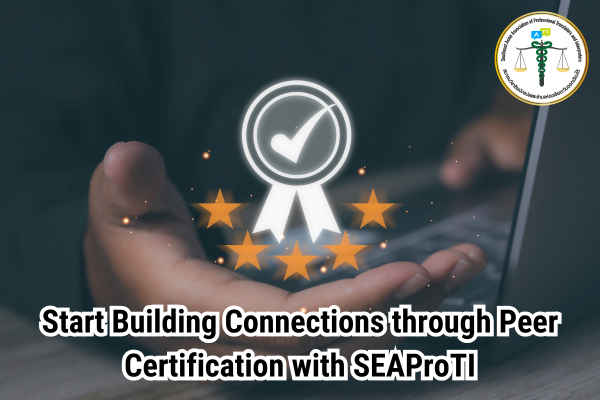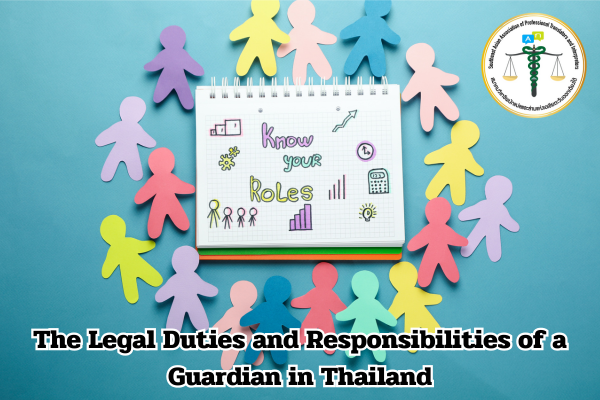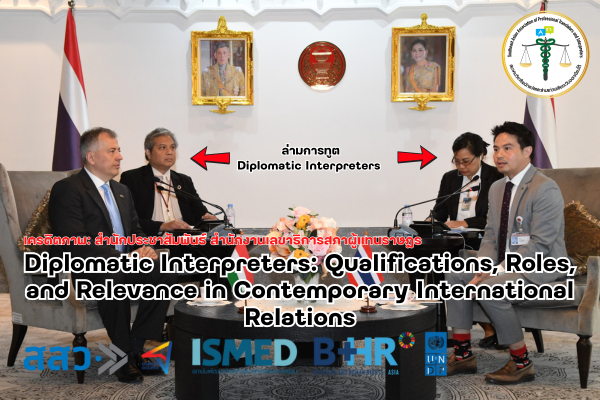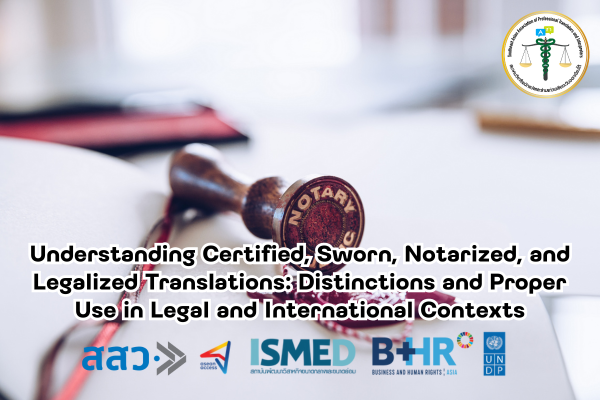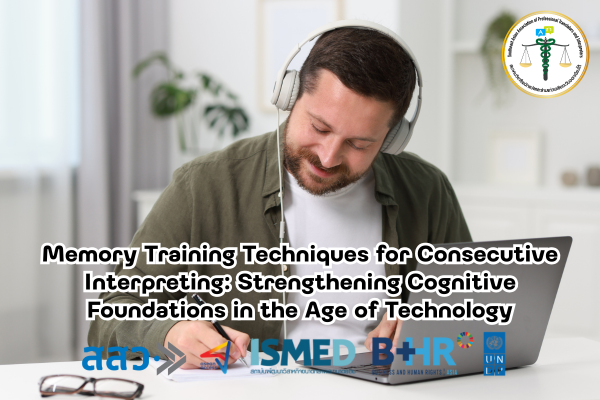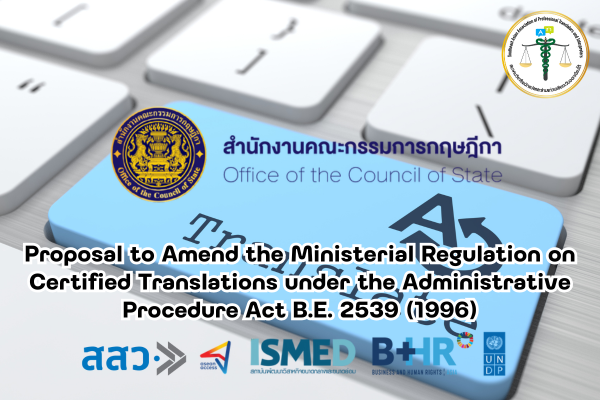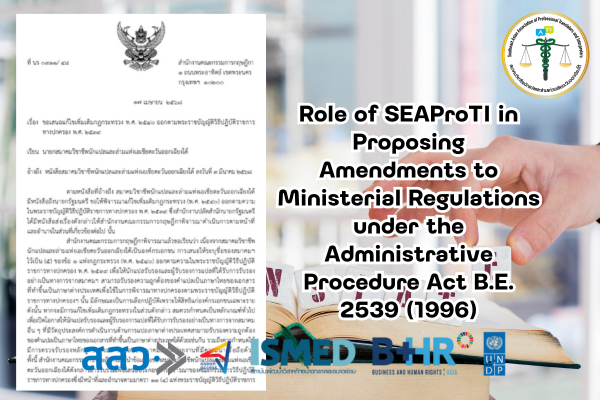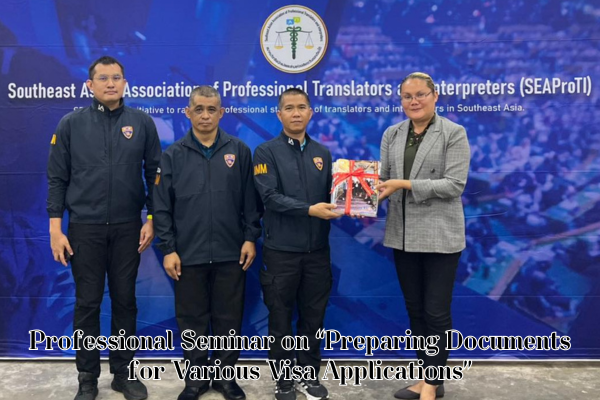Because Success Doesn’t Happen Alone:
Start Building Connections through Peer Certification
9 January 2568, Bangkok – The Peer Certification system by the Southeast Asian Association of Professional Translators and Interpreters (SEAProTI) is designed to elevate the standards and quality of the translation and interpreting profession. It emphasizes transparent, reliable evaluations and certifications while fostering collaboration among peers in the same field. This process not only certifies the standards of candidates but also provides numerous benefits for members and the association as a whole.
- Read the Association’s Bylaws as Officially Registered from the Start
- Ordinary Panelists Registered in Session 1/2025
- Ordinary Panelists Registered in Session 2/2025
Note:
For detailed contact information of ordinary panelists, all individuals preparing for registration can find it here: https://www.seaproti.org/practitioners/
Peer Certification Benefits
1. Builds Positive Relationships Among Professionals
The Peer Certification process fosters good relationships between association members and candidates by providing opportunities to exchange ideas and learn from one another. Panelists who evaluate candidates get to know them better, while candidates meet peers ready to support and advise them. This interaction promotes unity within the profession and encourages a collaborative working environment.
2. Creates a Network for Future Opportunities
Passing the Peer Certification system allows members to build strong professional networks. These connections extend beyond relationships with certified peers, encompassing collaborations on projects, job opportunities, and joint activities in the future. Such networks enhance business opportunities and ensure professional stability.
3. Encourages Knowledge and Experience Sharing
The Peer Certification system creates opportunities for members to exchange knowledge, expertise, and experiences in their profession. Through collaborative evaluation and learning processes, candidates receive constructive feedback from panelists to improve and develop their skills. At the same time, panelists learn new perspectives from candidates, enriching their professional growth.
4. Enhances Credibility as a Professional
Certification through Peer Certification confirms that candidates meet SEAProTI’s professional standards, recognized internationally. Employers and organizations perceive certified members as trustworthy and reliable professionals, improving their image among employers and society.
5. Promotes Transparency and Fairness
The Peer Certification system adheres to transparency and fairness principles. Panelists evaluating candidates must perform their duties professionally and impartially. Peer-to-peer evaluation reduces biases and enhances the credibility of the certification process.
6. Stimulates Self-Development
Participating in the Peer Certification process provides candidates opportunities to review and continuously improve their skills. This process not only prepares candidates for certification but also boosts confidence and long-term career potential.
Roles of Ordinary Panelists in Certification
Ordinary Panelists play a crucial role in the Peer Certification process, evaluating candidates’ abilities to meet defined standards. Their main responsibilities include:
1. Evaluating Qualifications and Skills
Panelists review candidates’ documents and portfolios, such as work histories, translation projects, and references, to assess whether candidates possess the necessary skills and experience for certification.
2. Administering Practical Tests (if required)
In some cases, panelists may administer practical tests, such as document translation or live interpreting, to evaluate real-world skills.
3. Providing Feedback
Panelists provide constructive feedback to candidates, especially in cases where candidates need to improve their skills to meet the standards.
4. Maintaining Standards and Fairness
Panelists must act transparently and impartially, fostering confidence in the certification process while refraining from requesting, receiving, or promising any benefits from candidates.
Certification Selection Guidelines
1. Application
Candidates must submit documents such as resumes, portfolios, or educational records and professional references to panelists. This allows panelists to assess that candidates have genuine work experience, do not pose risks to society, and contribute positively to their field.
2. Document Review
Panelists examine submitted documents to verify candidates’ qualifications and suitability.
3. Interviews or Practical Tests
Candidates may participate in interviews or practical tests to demonstrate skills in real-life scenarios. For instance, candidates may be asked to translate or interpret in front of panelists or invite them to observe their work.
4. Decision-Making
Panelists decide whether candidates pass the certification process. Certified candidates earn the title of Certified Professionals and enjoy associated benefits.
Conclusion
The Peer Certification system is not merely a certification process but a critical mechanism to foster collaboration within the translation and interpreting community. It encourages self-improvement, transparency, and international recognition. Certified professionals enhance their professional status and unlock sustainable career growth opportunities.
เพราะความสำเร็จไม่ได้เกิดขึ้นลำพัง เริ่มต้นสร้างเครือข่ายผ่าน Peer Certification
ระบบ Peer Certification ของสมาคมวิชาชีพนักแปลและล่ามแห่งเอเชียตะวันออกเฉียงใต้ (SEAProTI) ได้รับการออกแบบมาเพื่อยกระดับมาตรฐานและคุณภาพในวิชาชีพนักแปลและล่าม โดยเน้นการประเมินและรับรองที่โปร่งใส เชื่อถือได้ และยึดหลักการมีส่วนร่วมจากสมาชิกในวงการเดียวกัน กระบวนการนี้ไม่เพียงช่วยรับรองมาตรฐานของผู้สมัคร แต่ยังมีข้อดีหลากหลายที่ส่งผลดีต่อสมาชิกและสมาคมโดยรวม
อ่านข้อบังคบสมาคมที่เราจดแจ้งไว้ตั้งแต่ต้นของเรา: https://ratchakitcha.soc.go.th/documents/17185919.pdf
- สมาชิกสามัญ (Ordinary Panelists) ขึ้นทะเบียนครั้งที่ 1/2568: https://www.seaproti.org/article/registrar-announcement-certified-translators-and-interpreters-1-2025/
- สมาชิกสามัญ (Ordinary Panelists) ขึ้นทะเบียนครั้งที่ 2/2568: https://www.seaproti.org/article/registrar-notification-certified-translators-and-interpreters-2-2025/
หมายเหตุ: สำหรับรายละเอียดในการติดต่อ ทุกท่านที่เตรียมตัวขึ้นทะเบียน สามารถหาได้ที่: https://www.seaproti.org/practitioners/
ข้อดีของระบบ Peer Certification
1. สร้างมนุษยสัมพันธ์ที่ดีกับนักวิชาชีพในสมาคม
กระบวนการ Peer Certification ช่วยส่งเสริมความสัมพันธ์อันดีระหว่างสมาชิกสมาคมและผู้สมัคร โดยมีโอกาสในการแลกเปลี่ยนความคิดเห็นและเรียนรู้ซึ่งกันและกัน สมาชิกสามัญที่ทำหน้าที่ประเมินจะได้ทำความรู้จักกับผู้สมัครมากขึ้น ในขณะเดียวกัน ผู้สมัครเองก็จะได้พบกับเพื่อนร่วมวิชาชีพที่พร้อมสนับสนุนและให้คำปรึกษา การมีปฏิสัมพันธ์ในลักษณะนี้ช่วยสร้างความสามัคคีในวงการ และส่งเสริมให้เกิดสภาพแวดล้อมการทำงานที่มีความร่วมมือกันอย่างสร้างสรรค์
2. สร้างเครือข่ายเพื่อการต่อยอดในอนาคต
การผ่านระบบ Peer Certification เปิดโอกาสให้สมาชิกสร้างเครือข่ายที่เข้มแข็งในวิชาชีพ เครือข่ายนี้ไม่ได้จำกัดเพียงการสร้างความสัมพันธ์กับผู้ที่ผ่านการรับรองเท่านั้น แต่ยังรวมถึงการร่วมมือในโครงการต่าง ๆ การแลกเปลี่ยนโอกาสการจ้างงาน และการจัดกิจกรรมร่วมกันในอนาคต ความเชื่อมโยงเหล่านี้ช่วยเพิ่มโอกาสทางธุรกิจและสร้างความมั่นคงในวิชาชีพ
3. ส่งเสริมการแบ่งปันความรู้และประสบการณ์
ระบบ Peer Certification ช่วยสร้างโอกาสให้สมาชิกได้แลกเปลี่ยนความรู้ ความชำนาญ และประสบการณ์ในวิชาชีพ ผ่านกระบวนการประเมินที่เน้นความร่วมมือและการเรียนรู้ซึ่งกันและกัน ผู้สมัครจะได้รับคำแนะนำจากผู้ประเมินเพื่อปรับปรุงและพัฒนาตนเอง ในขณะเดียวกัน สมาชิกสามัญที่ทำหน้าที่ประเมินก็มีโอกาสเรียนรู้จากผู้สมัครที่อาจนำเสนอมุมมองใหม่ ๆ ในการทำงาน
4. เพิ่มความน่าเชื่อถือในฐานะนักวิชาชีพ
การได้รับการรับรองผ่าน Peer Certification เป็นการยืนยันว่าผู้สมัครมีคุณสมบัติครบถ้วนและปฏิบัติตามมาตรฐานวิชาชีพของ SEAProTI ซึ่งเป็นที่ยอมรับในระดับสากล ผู้ว่าจ้างและองค์กรต่าง ๆ จะมองผู้ที่ได้รับการรับรองว่าเป็นนักวิชาชีพที่มีความน่าเชื่อถือและสามารถไว้วางใจได้ ส่งผลให้ภาพลักษณ์ของสมาชิกที่ได้รับการรับรองดีขึ้นในสายตาของผู้ว่าจ้างและสังคมโดยรวม
5. สนับสนุนความโปร่งใสและความเป็นธรรม
ระบบ Peer Certification ยึดมั่นในหลักความโปร่งใสและความยุติธรรม สมาชิกสามัญที่มีบทบาทในกระบวนการรับรองจะต้องปฏิบัติหน้าที่อย่างมืออาชีพและเป็นธรรม การใช้การประเมินจากเพื่อนร่วมวิชาชีพช่วยลดอคติและเสริมสร้างความน่าเชื่อถือให้กับกระบวนการรับรอง
6. กระตุ้นการพัฒนาตนเอง
การเข้าร่วมระบบ Peer Certification เป็นโอกาสที่ผู้สมัครจะได้ทบทวนและพัฒนาทักษะของตนเองอย่างต่อเนื่อง กระบวนการนี้ไม่เพียงช่วยให้ผู้สมัครเตรียมพร้อมเพื่อการรับรอง แต่ยังช่วยเสริมสร้างความมั่นใจและศักยภาพในการทำงานในระยะยาว
บทบาทของสมาชิกสามัญ (Ordinary Panelists) ในการรับรอง
สมาชิกสามัญ (Ordinary Panelists) มีบทบาทสำคัญในกระบวนการ Peer Certification โดยทำหน้าที่เป็นผู้ประเมินความสามารถของผู้สมัครให้เป็นไปตามมาตรฐานที่กำหนด บทบาทหลักของสมาชิกสามัญมีดังนี้:
1. การประเมินคุณสมบัติและทักษะ
สมาชิกสามัญทำหน้าที่ตรวจสอบเอกสารและผลงานของผู้สมัคร เช่น ประวัติการทำงาน ผลงานแปล และข้อมูลอ้างอิง เพื่อพิจารณาว่าผู้สมัครมีความสามารถและประสบการณ์เพียงพอที่จะได้รับการรับรองหรือไม่
2. การสอบปฏิบัติ (ถ้ามี)
ในบางกรณี สมาชิกสามัญอาจจัดการสอบปฏิบัติ เช่น การสอบแปลเอกสารหรือการล่ามสด เพื่อประเมินทักษะในสถานการณ์จริง
3. การให้คำแนะนำ
สมาชิกสามัญให้คำแนะนำเชิงสร้างสรรค์แก่ผู้สมัคร โดยเฉพาะในกรณีที่ผู้สมัครยังต้องปรับปรุงทักษะเพื่อให้เป็นไปตามมาตรฐาน
4. การรักษามาตรฐานและความเป็นธรรม
สมาชิกสามัญต้องทำหน้าที่อย่างโปร่งใสและยุติธรรม เพื่อสร้างความเชื่อมั่นในกระบวนการรับรอง และไม่เรียก ไม่รับ และไม่สัญญาว่าจะรับ ผลประโยชน์ใด ๆ จากกันและกันระหว่างสมาชิกสามัญและผู้สมัคร
แนวทางในการเลือกรับรองสมาชิกในระบบ Peer Certification
1. การสมัคร
ผู้สมัครต้องยื่นเอกสาร เช่น ประวัติการทำงาน ใบแสดงผลงาน หรือข้อมูลการศึกษา พร้อมข้อมูลอ้างอิงจากบุคคลในวงการ ต่อ สมาชิกสามัญ เพื่อให้สมาชิกสามัญได้เห็นว่า ผู้สมัครทำงานจริง ไม่สร้างปัญหา ไม่เป็นภัยต่อสังคมและต่อประชาชน
2. การประเมินเอกสาร
สมาชิกสามัญจะตรวจสอบเอกสารที่ส่งมาเพื่อตรวจสอบคุณสมบัติและความเหมาะสมของผู้สมัคร
3. การสัมภาษณ์หรือสอบปฏิบัติ
ผู้สมัครอาจต้องเข้าร่วมการสัมภาษณ์หรือการสอบปฏิบัติเพื่อแสดงทักษะและความสามารถในสถานการณ์จริง เช่น สอบทำแปลให้สมาชิกสามัญดู หรือ สอบทำล่าม หรือเชิญไปสังเกตการณ์การทำงานให้สมาชิกสามัญได้เห็นเป็นที่ประจักษ์ จึงจะสร้างความเชื่อมั่นให้สมาชิกสามัญสามารถรับรองได้
4. การตัดสินใจ
สมาชิกสามัญจะลงมติว่าผู้สมัครผ่านการรับรองหรือไม่ หากผ่าน ผู้สมัครจะได้รับสิทธิ์เป็นสมาชิกที่ได้รับการรับรอง (Certified Professionals)
สรุป
ระบบ Peer Certification ไม่เพียงแต่เป็นกระบวนการรับรองมาตรฐานวิชาชีพ แต่ยังเป็นกลไกสำคัญที่ช่วยส่งเสริมเครือข่ายความร่วมมือในวงการนักแปลและล่าม กระบวนการนี้สนับสนุนการพัฒนาตนเอง ความโปร่งใส และการยอมรับในระดับสากล ทำให้ผู้ที่ผ่านการรับรองสามารถยกระดับสถานะในวิชาชีพและเปิดโอกาสในการเติบโตในสายงานอย่างยั่งยืน
เกี่ยวกับนักแปลรับรอง ผู้รับรองการแปล และล่ามรับรองของสมาคมวิชาชีพนักแปลและล่ามแห่งเอเชียตะวันออกเฉียงใต้
สมาคมวิชาชีพนักแปลและล่ามแห่งเอเชียตะวันออกเฉียงใต้ (SEAProTI) ได้ประกาศหลักเกณฑ์และคุณสมบัติผู้ที่ขึ้นทะเบียนเป็น “นักแปลรับรอง (Certified Translators) และผู้รับรองการแปล (Translation Certification Providers) และล่ามรับรอง (Certified Interpreters)” ของสมาคม หมวดที่ 9 และหมวดที่ 10 ในราชกิจจานุเบกษา ของสำนักเลขาธิการคณะรัฐมนตรี ในสำนักนายกรัฐมนตรี แห่งราชอาณาจักรไทย ลงวันที่ 25 ก.ค. 2567 เล่มที่ 141 ตอนที่ 66 ง หน้า 100 อ่านฉบับเต็มได้ที่: นักแปลรับรอง ผู้รับรองการแปล และล่ามรับรอง


